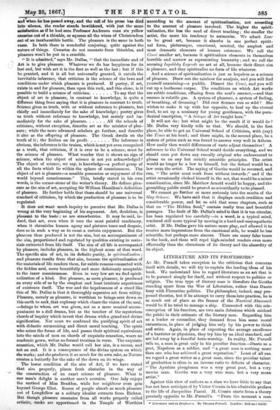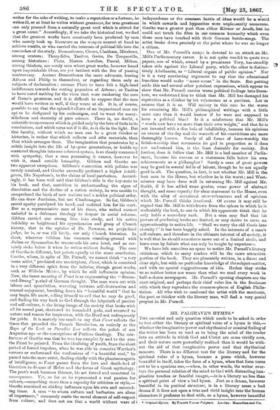LITERATURE AND ITS PROFESSORS.*
As Mr. Purnell takes exception to the criticism that concerns itself with details, we will try to explain the leading ideas of his book. We understand him to regard literature as an art that is to be pursued simply for itself, and without respect to politics or religion. The true type of literary man is therefore the Goethe standing apart from the War of Liberation, rather than Dante hues, with Florentine politics. The philosopher, indeed, may pro- pound theories, but if he attempt to carry them into practice, he is as much out of place as the framer of the Nautical Almanack would be if he tried to manage a ship. Connected with this mis- conception of his function, are two main delusions which mislead the public in their estimate of the literary man. Regarding him as a leader or counsellor, they demand from him some moral earnestness, in place of judging him only by his power to think and write. Again, in place of expecting the average excellence of a barrister or physician, they Lay him by an ideal standard, and are led away by a fanciful hero-worship. In reality, Mr. Purnell tells us, a man is great only in his peculiar function—Dante as a poet, Napoleon as a soldier, and "a great man is nothing more than one who has achieved a great reputation." Least of all can we regard a great writer as a great man, since the peculiar talent of production is often in an inverse ratio to defects of character. "The Ayrshire ploughman was a very great poet, but a very unwise man. Goethe was a very wise man, but a very mean artist."
Against this view of authors as a class we have little to say that has not been anticipated by Victor Cousin in his admirable preface to the life of Jacqueline Pascal. M. Cousin starts from a theory precisely opposite to Mr. Purnell's. "From the moment a man
• Literature and fa Proles:0-s. By Thomas Purnell. Loudon: Bell an t Daldy. -writes for the sake of writing, to make a reputation or a fortune, he !natal ill, or at least he writes without greatness, for true greatness can only proceed from a naturally great soul which is stirred for a great cause." Accordingly, if we take the historical teat, we find that the greatest works have constantly been produced by men who merely took up literature as the weapon nearest at hand to achieve results, or who carried the interests of politicallife into the researches of the study. Demosthenes, Cicero, Chatham, Mirabeau, among orators; Thucydides, Tacitus, G-rote, De Tocqueville, among historians ; Plato, Marcus Aurelius, Pascal, Milton, among thinkers, are surely men whose great works, however based upon imperishable ideas, are yet instinct with the fire of passing controversy. Assume Demosthenes the mere advocate, leaving 'Athens and Philip to themselves, or regarding them only as subjects of declamation ; assume Plato to have felt a high-bred indifference towards the rotting paganism of Athens ; or 'racitus to have cared nothing for the vices that were cankering the core of Rome's greatness, and it is difficult to suppose that the men would have written as well, if they wrote at all, it is, of course, possible to say that the splendid efforts of an impassioned man are apt to be disfigured by his enthusitism, and to want the many- eidedness and sincerity of pare science. There is, no doubt, a scientific temperament which is guided only by the love of facts in its conclusions, and which cares not if it die, so it die in the light. But this faculty, without which no man can be a great thinker or historian, is rather that which collects and sifts materials, than that which arranges them. The imagination that penetrates by a subtle insight into the life of by-gone generations, or builds up scattered thoughts into one coherent system, is so closely connected with sympathy, that a man possessing it cannot, however he wish it, stand outside humanity. Gibbon and Goethe are two apparent exceptions. Gibbon's connection with politics was merely nominal, and Goethe avowedly preferred a higher iutelli- gence, like Napoleon's, to the claims of local patriotism. Accord- ingly, it has been well said that Gibbon's title is the key-note to his book, and that, matchless in understanding the signs of dissolution and the decline of a rotten society, he was unable to comprehend the birth of new nations and a nobler political order. He can draw Justinian, but not Charlemagne. So far, Gibbon's moral apathy paralyzed his hand, aud unfitted him for his work. But as a representative man of his times, who united earnest unbelief in a dishonest theology to despair in social reforms, Gibbon carried one strong bias into study, and his active infidelity so heightened his apprehension and grasp of Church history, that in the opinion of Dr. Newman, no prejudiced judge, be is, or was till lately, our only Church historian. In short, wherever Gibbon has common standing-ground with Julian or Symmachus he transcends his own level, and as cer- tainly sinks below it when he writes without feeling. The case of Goethe is different, but points equally to the same conclusion. Goethe, whom, in spite of Mr. Purnell, we cannot think "a very mean artist," produced one masterpiece, Faust, which is conceived in a very different spirit from the inferior, though great works, such as Wilhelm Meister, by which he still influences opinion. Now, the inner meaning of Faust is as representing the " Sturm- und-Drang" period of German thought. The man worn out with labour and speculation, wavering between self-destruction and 'sensual enjoyment, breaking down his "beautiful world" that he may begin life anew, selling himself to evil that he may do good, and finding his way back to God through the labyrinth of passion and self-culture, is the living image of the society that broke with all its unreal past, shattered its household gods, and reverted to nature and reason for inspiration, with the Devil not unfrequently for guide. It is scarcely too much to say that Faust reflects the -times that preceded the French Revolution, as entirely as the Rape of the Lock or Paradise Lost reflects the polish of our Augustan age or the conceptions of Puritan theology. The mis- fortune of Goethe was that be was too complet3ly and to the core the Faust he painted. From the idealizing of youth, from the short period of forced impulses, when he was able to conceive Werther's sorrows or understand the confessions of "a beautiful soul," he passed into the mere artist, dealing chiefly with the phantasmagoria of intelligence, as Faust passes from the love and death-bed Of Gretchen to dreams of Helen and the forms of Greek mythology. The poet's work becomes thinner, his art forced and unnatural in consequence. Yet, so far as he represented a real passion for culture,—something more than a capacity for criticism or style,- Goethe remained an abiding influence upon his own and succeed- ing times. A man "to whom culture and barbarism are alone of importance," commonly omits the moral element of self-respect from culture, and does not see that a world without wars of
independence or the constant battle of ideas would be a world in which cowards and hypocrites were unpleasantly numerous. Goethe was a greater poet than either -Korner or Arndtebta he could not touch the fibre in our common humanity which even those men have touched with their German battle-songs. The artist broke down precisely at the point where he was no longer a citizen.
One of Mr. Purnell's essays is devoted to an attacken Mr. Mill's Parliamentary career. It is not quite candid to quote two papers, one of which, owned by a prominent Tory, has steadily taken side against the Liberal party, while the other is distinc- tively Adullatnite, as "Liberal organs of public opinion." Nor is it a very convincing argument to say that the educational franchise would make"noses count" in the State. But putting aside this and several other petulant expressions, which appear to show that Mr. Purnell carries warm political feeliag3 into litera- ture, we understand him to think that Mr. Mill has damaged his reputation as a thinker by his vehemence as a partizan. Let us assume that it is so. Will society in this CM.: be the worm for examining Mr. Hill's philosophical writings with a little more care than it would bestow if he were not supposed to have a political blies? Is it a misfortune that Mr. Mill's "words now have no more than their own weight," and that he .is not invested with a dim halo of infallibility, because his opinions on events of the day and the warmth of his convictions are more thoroughly known. Surely of all forms of hero-worship the fetish-worship that reverences its god in proportion as it does not understand him, is the least desirable for socieey. But further, does it follow that Mr. Mill is a bad member of Parlia- ment, because his success as a statesman falls below his own achievements as a philosopher? Surely a man of great pewees may be good in several fields of labour, though he be not equally good in all. The question, in fact, is not whether Mr. Mill is the beet man in the House, but whether he is the worst ; and West- minster may have done well in retuning Mr. Mill against Mr. Smith, if it has added some genius, some power of abstract thought, and some capacity for clear statement to the House, even with the alloy of occasional over-vehemence and of opinions which Mr. Purnell thinks irrational. Of course it may still be argued that Mr. Mill is withdrawn from the sphere in whieh he is undeniably the best, to one in which his opponents think that he only holds a secondary rank. But a man may find that his powers of producing books are limited, or may desire to serve an apprenticeship to active life. "Shall we carry the old thesis into eternity ?" it has been happily asked. In the interests of a man% self-culture, and therefore in the ultimate interest of all -*moiety, it is well that he should sometimes move out of a limited circle, and learn even by failure what can only be taught by experience.
We have left ourselves no space to notice Mr. Parnell's literary criticisms, which to many readers will be the more attractive portion of the book. They are pleasantly written, in a fluent and clear style but with no particular knowledge of the subject-matter, and with no special suggestiveness of idea. Rather they strike us as neither better nor worse than what we read every week in half-a-dozen newspapers. Mr. Ptume,ll's epening chapters. are the most original, and perhaps their chief value lies in the freshness with which they reproduce the common-places of English
tinism. All who wish to confound the artist with the mechanic, the poet or thinker with the literary man, will find a very genial prophet in Mr. Parnell.































 Previous page
Previous page